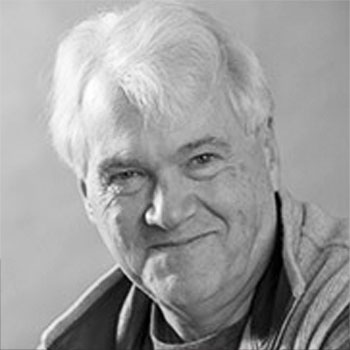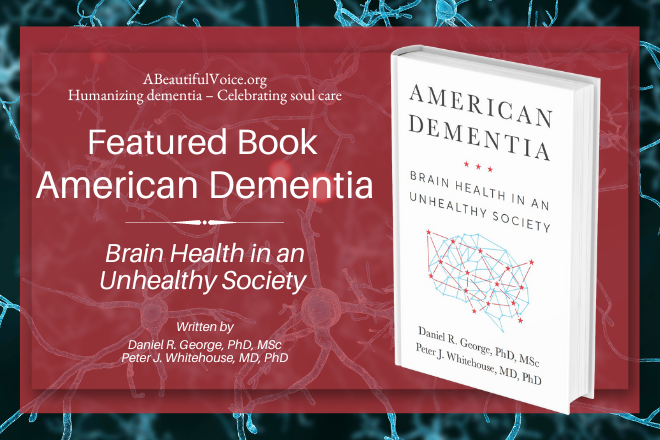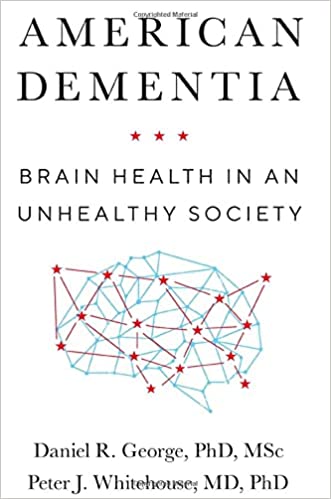Awarded a National Mature Media Awards’ Gold designation for 2022
Authors:

Daniel George, PhD, MSc, is Associate Professor in Medical Humanities, Penn State University College of Medicine. He is co-author of The Myth of Alzheimer’s: What You Aren’t Being Told About Today’s Most Dreaded Diagnosis (2008). He earned his MSc and PhD in Medical Anthropology from Oxford University in England. He graduated summa cum laude and phi beta kappa, earning his B.A. in English and Philosophy from The College of Wooster (OH). An artist and musician, he is also co-founder, The Farmers Market, Hershey, PA.
 Peter Whitehouse, MD, PhD, is an internationally-recognized Alzheimer’s expert and thought leader, a geriatric neurologist, cognitive neuroscientist, and bioethicist. With Daniel George, he is author of The Myth of Alzheimer’s: What You Aren’t Being Told About Today’s Most Dreaded Diagnosis (2008). He is founder, The University Alzheimer Center (now the University Brain Health and Memory Center) at Case Western Reserve University and University Hospitals Case Medical Center. With his wife Catherine, he is founder of The Intergenerational School, Cleveland, OH.
Peter Whitehouse, MD, PhD, is an internationally-recognized Alzheimer’s expert and thought leader, a geriatric neurologist, cognitive neuroscientist, and bioethicist. With Daniel George, he is author of The Myth of Alzheimer’s: What You Aren’t Being Told About Today’s Most Dreaded Diagnosis (2008). He is founder, The University Alzheimer Center (now the University Brain Health and Memory Center) at Case Western Reserve University and University Hospitals Case Medical Center. With his wife Catherine, he is founder of The Intergenerational School, Cleveland, OH.
In this 2021 publication, Authors Daniel George, PhD, MSc and Peter Whitehouse, MD, PhD, have applied a problem-solving technique used by former President Dwight D. Eisenhower. In discussions about major problems, the former president utilized what came to be known as the “Eisenhower Principle.” The purpose was to intentionally make the problem bigger. Big enough to be able to see solutions leading to “re-formation” of the problem!
The authors of American Dementia have applied the same problem-solving technique. By applying the definition of “clinical dementia” to a more visible condition beyond the individual, they have diagnosed “society” with having “cultural dementia,” a condition which affects communities.
They guide us to look at the brokenness and dysfunction in our communities during the most recent four decades.
And so, we begin with the “onset of American Dementia”:
1970-present – These years represent a retreat from a period of social democracy and the onset of a period of hyper-capitalism. Dementia became medicalized. The individual’s problem would be solved by “enlightened consumption.” It is a period in which big pharma contributed a 99.9% fail rate for Alzheimer’s drugs.
This is contrasted with an earlier period in history which scholars have called the social democracy of the mid-20th century. Dr. George and Dr. Whitehouse have investigated what was happening in the period 1945-1970 to result in a reduced rate of dementia noted within the last decade.
1945-1970 – These years represent what scholars have called the period of social democracy. Policies of this era were marked by greater access to education, healthcare, cleaner air, soil, and water – all of which we know, of course, to be brain-healthy.
It is the policies in these years – 1945-1970 – which the authors have linked to the decline in dementia rates in the last ten years. Regardless of the failures of big pharma, recent research is finding a decline in dementia rates in the US and Western Europe in the last decade.
Alzheimer’s through a different lens: “cultural dementia”
The authors’ comprehensive research project covers many aspects of our lives – including racism, poverty, climate change, environmental challenges, loneliness, and other stressors. It is notable that during this period of hyper-capitalism (1970-present), stress is ranked as #1 among “consequences to public health.”
Stress in America ranks a stunning 20 percentage points higher than the global average, they state. This is not about occasional stress, but chronic, non-stop stress. The causes in our hyper-capitalistic environment include – among others:
- Being weary of living with constant angst and insecurity,
- Being considered a disposable commodity,
- Feeling isolated and lonely, and…
- Lack of trust, solidarity, and connection to neighbors.
The authors note that in this environment, individuals are independent and free to pursue their self-interest within the hyper-capitalistic markets of healthcare, education, housing, food, water, and police. How these services are delivered impacts all aspects of our lives.
For example, we may dismiss Flint, Michigan – a community victimized by an ongoing period of “austerity crisis” – thinking that our community could never be the next Flint, Michigan… Likewise, our community could never be like Jackson, Mississippi, the state capitol, with its crippling water crisis this summer.
The authors note the “justified anger and contempt” directed at establishment political institutions serving corporate wealth and power – but which are no longer working for other members of society.
“Indeed, when we view Alzheimer’s through a different lens – not merely as an individuated biomedical disease but rather as the phenomena produced in part by the unjust political-economic structures, values, and priorities of our time – it can empower us to see how neoliberalism is not merely fixing our understanding of Alzheimer’s in a limiting way. It is actively driving society-level risk factors for brain aging.” (p. 25).
The systems which have benefited during this period of dysfunction have contributed to those risk factors which lead to the diagnosis of “clinical dementia.”
According to these scientists, our “cultural story of Alzheimer’s” has been powerfully “produced” by the hyper-capitalist order.
Treating our American dementia
American Dementia, published in September 2021, builds upon the authors’ 2008 publication, The Myth of Alzheimer’s, which has turned out to be prognostic in large part. Met with a considerable amount of criticism when published, the authors’ views are now considered to be mainstream.
In the intervening years since the publication of The Myth of Alzheimer’s in 2008, our moral challenges have become more visible – especially during the pandemic – calling out for a radical shift toward more humane values and actions.
If we accept Alzheimer’s as a disease construct, it is much easier to move forward to an acceptance of the kind of “cure” which we really need. What would be the “cure”? What would be the effective treatments of cultural American dementia?
An eco-psycho-social model of health
We could impact everyone’s brain health with a model which the authors have created and introduced – an “ecopsychosocial” (eco-psycho-social) model of health. This model would begin with support for the person diagnosed with dementia, the primary caregiver, and the family as they begin a completely new chapter, navigating new landscapes together. But it would also extend beyond the family: to societal threats such as pollution, political unrest, economic disaster – and more.
In other words, addressing the condition of “cultural dementia” to which the authors have introduced us would improve the health of everyone. The human tragedy is created by a hyper-capitalistic society; a medicalized culture; the stigma which begins the day of diagnosis, and the lack of appropriate interventions and support.
Leadership matters: Insisting on dignity for all
Why aren’t we insisting on dignity for all? Leadership matters in these chaotic days. The former president’s response to the nation and to the world was this: “The only ones who are dying are old people.” It was dismissive. It was dispassionate. And it was a typically cavalier “disconnect.”
The authors’ highly researched, expert opinion regarding care of elders in nursing homes during the pandemic is noted here:
“A staggering one-third of all US deaths from COVID-19 have occurred in nursing homes … In prioritizing investor profit, market forces appear to have engineered insufficient investment in staffing and personal protective equipment, inattention to safety protocols, and distorted data regarding quality of care, the combination of which allowed the deadly virus to run rampant in these homes…” (p. 312).
During the pandemic, similar conclusions have been reached by ethicists, geriatricians, gerontologists, and elder care specialists. Is there an informed voice who would say that this number of deaths in nursing homes is acceptable? How is it possible that the public would not be aware of these human rights violations?
Evidence has been provided in report after report – narrative after narrative. It is evidence-based – documented and compelling. It is now no longer “just” my personal narrative as “the daughter” – a caricature without a name and a voice.
Rite de passage – correcting the inequities
Will it be left to a younger generation to correct our societal inequities?
“… millennials generally have a sense that things need to fundamentally change, that no sane society would be organized like this … and needs to be replaced with better, healthier, and more sustainable political-economic orders.” (p. 317).
It is a personal observation: young people are often the ones coming forward and speaking boldly, frequently appearing “in it together” – and showing up in teams with sleeves rolled up.
It’s the generations who have preceded millennials who appear overwhelmed with the challenging needs of those closest to them. In the political-economic arena, they appear to be ducking, hiding, and withholding or distorting truth. This behavior has had a pervasive effect in this post-truth era.
Millennials need only to look to the current period in our history to know what not to do. Inheriting a legacy in ruins will be an unfair and overwhelming burden for the millennials.
Can our national leaders bring some order to this period of confusion and chaos before it’s too late?
Can we restructure the failing institutions in society?
The authors identify the main question being whether, going forward, we can “meaningfully restructure the failing societal institutions of our fading empire.” A mindset which accepts the status quo with no thought of questioning it or attempting to improve it causes us all to fall behind on both an individual and collective basis.
According to the authors, it is my contemporaries – including myself – who are the ones to have benefitted in the last decade from the policies and social programs available to us in the period 1945-1970.
In addition, those who have benefitted from greater access to education, healthcare, and other brain-healthy policies during this period appear to take their protected and peaceful lives for granted. Could it be they do not recognize how social programs helped to shape them? So, they do not see the need for structural change?
From the Supreme Court to local communities such as Uvalde, attention to the suffering of others does not seem to be on the radar. We witness self-protective actions rather than caring, supporting, and investing in one another. During this challenging time, it is a lesson in the duality of humanity.
Analogies between cultural dementia and clinical dementia
I’m writing these summary paragraphs in the week following the set-back of women’s health by 50 years – and within one day of Cassidy Hutchinson’s testimony. I am struck by the polarization and criticism following her truth-telling.
But wasn’t it predictable that following her courageous testimony, she would be discredited – even villainized – to silence her? It has become sport.
The summary which follows here reflects my personal responses to these events and not necessarily those of the authors. To further illustrate the analogies which the authors make between cultural dementia and clinical dementia, I have listed below recent societal events which are analogous with my personal experience as ombudsman for my parents – both persons living with dementia.
In our cultural dementia, the recent opinions of the Supreme Court are devastating and dangerous for women and families. Is taking away fundamental healthcare rights also setting a precedent about our right to privacy in other policy decisions in the future?
In our clinical dementia, stigma and ageism surrounding the dementia diagnosis is also, needlessly, devastating – and dangerous to our health and well-being.
Cultural dementia and clinical dementia evoke confusion and a full range of emotions – from outrage to sadness, concern, and deep worry in response to the uncertain peril lying ahead.
The peril in cultural dementia is the potential loss of liberty, personal freedom, and democracy itself.
The peril in clinical dementia is the dread of losing the ability for self-governance upon being diagnosed.
Cultural dementia and clinical dementia both emerge within a chaotic environment.
In cultural dementia, it has been the nature of hyper-capitalism since the 70’s to be chaotic. The leadership of the former president has compounded the current chaos by lighting the fire.
In clinical dementia, chaos begins with the diagnosis: the medicalized response, the lamentable lack of support provided to the person being diagnosed, the woeful lack of support for the family care partner, and the deep sadness experienced in being abandoned.
It is still stunning to me that in 1997, my mother learned her diagnosis without a family member present. And today, according to dementia leaders and activists, relatively little has changed about the lack of support in that critical moment of learning the diagnosis. This lack of caring demonstrates our falling short of being compassionate and fully human.
But we can do so much better! Why aren’t we? As stated above, this American dementia has been powerfully produced!
An “other-help” book
The authors weave into the storyline that this is more than a self-help book for an audience concerned about its own brain health.
“… [This is] an ‘other-help’ book with a higher moral charge that looks outward at society and our collective destiny… aiming at a healthier and more dignified human society as the most effective and efficient intervention for our brain health.” (xii – Preface).
The authors are not saying that we are unable to enhance our brain health as individuals. But they are saying that this approach alone is inadequate morally and ethically. A higher moral calling must look at society’s collective destiny.
A beaming light – illuminating the need for a more caring, responsive society
To illuminate the change needed in how we support people living with dementia, the authors have beamed a light on what is viewed as “acceptable standards” for institutional care. Consumers must become aware of what that means for care of their loved ones and speak up for changing what has been accepted for the most recent 50 years as “standard” and “5-star.”
But speak up – we must! And if words are drowned out by an uninformed majority, then we must demonstrate by our actions that this is not befitting the respect and dignity of our frail elders.
Amplifying leaders of the change movement
I am a publisher of ABeautifulVoice.org, having invested considerable time and resources in attempting to build this e-magazine, not once, but a second time following a crash. Thus, still in infancy, it’s an ultra-modest platform to say the least. But it’s “home” for using my voice again following a period of regeneration after the website crash.
My mission in publishing is a natural extension of my role as a family care partner. That role was defined by deep concern about the challenging environment in which frail elders with dementia live out their final days.
I support – and will amplify – leaders who are creating a better world. And I will continue to focus on alternative ways of thinking about and creating a more caring economy – a subject which has long been an interest. This is not about competition, but about cooperation. Why? Our institutions can and must do better in meeting the needs of persons living with dementia and their families.
Our current, established, and deeply-rooted culture of care during this period and dating back to the 70’s is not a subject for the faint of heart.
Being countercultural means asking tough questions
Over two decades ago, it seemed “countercultural.” Being countercultural was an added “responsibility,” i.e., challenge – for a family care partner assuming this role. To provide the best care for loved ones, it was necessary to question everything. This statement will be quickly grasped by those who understand that our current American response to clinical dementia is still being driven by big pharma and a conventional biomedical community.
Thanks to those fearless leaders, including the authors of The Myth of Alzheimer’s and American Dementia, we are witnessing the emergence of new models of care – some of which was prompted by the revelations of the pandemic. However, the suffering – and the tragedy – which many people living with dementia and their families endured during this period continues to be mostly an untold story.
Based on experience with my parents, I do not believe that suffering is implicit in dementia. Rather, that suffering is created by how our culture responds to this diagnosis. I didn’t have a name for this phenomenon. But now, “cultural dementia,” or more specifically, “American Dementia” – both capture the essence. I will be referencing it frequently going forward.
I am unsettled in a search for answers to “What next?” in today’s political climate.
How are we ever going to advance society in this post-truth world when we are so polarized by the annihilation of truth? Can we fix health care before we fix society? How can we create a more caring economy for everyone? What legacy are we leaving for the generations who follow? What is our personal role?
Oh, that we might care for elder loved ones as “the greatest of these” – the most deserving of respect and dignity – rather than as “the least of these.” That would require a huge shift and softening of the cultural mindset and the soul of America.
As Dr. Robin Smith so frequently stated, long before the chaos ignited in 2016: There’s a hole in the soul of America.
What kind of society do we want?
I encourage readers to think deeply and explore the solutions found in this publication – all of which promotes transformational change throughout society. I believe that change is underway, but we are at a perilous tipping point.
As the authors state: “Ultimately, improving brain health will require substantial changes in how we are governed, how we care for one another, and the investments we make in one another.”
We cannot become numb. For good to prevail, we cannot sit on the sidelines.
Author: Susan Troyer, BA, MS




Dear Sue, very thought provoking review. Thanks so much for your continuing work on this subject.
Thank you, Mary!